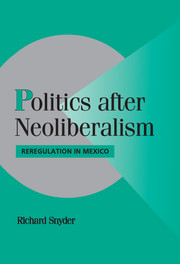2 - FROM DEREGULATION TO REREGULATION IN THE MEXICAN COFFEE SECTOR
Published online by Cambridge University Press: 03 December 2009
Summary
At the end of the 1980s the Mexican government launched a massive deregulation of agriculture. For the mostly foreign-trained technocrats who designed these neoliberal economic reforms, the coffee industry posed perhaps the easiest target for deregulation. Although an entrenched state-owned enterprise – the Mexican Coffee Institute (INMECAFE) – dominated the industry, a powerful grassroots movement of small coffee producers had already mobilized against it. Thus, neoliberal reformers had strong societal allies, making government retrenchment in the coffee sector an easy task.
Yet this easy retrenchment had surprising consequences. Rather than leading to unregulated markets, as the neoliberal reformers had anticipated, the dismantling of INMECAFE resulted in the formation of new institutions for market governance. Actors who had not previously intervened in coffee sought to control policy areas vacated by the old state-owned enterprise. Most notably, the governments of Mexico's coffee producing states established new regulatory frameworks and essentially reregulated what federal law had deregulated. As a result, by 1994, Mexico's coffee producers found themselves confronting a new and complex regulatory environment and not the free markets that had been anticipated.
In the states of Oaxaca and Chiapas the politics of reregulation led to participatory policy frameworks that gave organizations of small producers central roles in policymaking. In addition to meeting producers' demands for a voice in the policy process, these participatory frameworks fostered partnerships between the public sector and producer organizations that helped improve the welfare and market competitiveness of small coffee farmers. In the states of Guerrero and Puebla, by contrast, the politics of reregulation resulted in exclusionary policy frameworks that denied small producers access to the policy process.
- Type
- Chapter
- Information
- Politics after NeoliberalismReregulation in Mexico, pp. 21 - 50Publisher: Cambridge University PressPrint publication year: 2001



